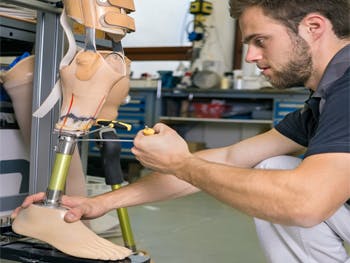UNIVERSITY NEWS LAST UPDATED : 17 JANUARY 2017

Biomedical Engineering lies at the interface between engineering with medicine and biology. From creating 3D organs or artificial limbs, through to the titanium plate used to repair Malala Yousafzai’s skull following her injuries inflicted by a Taliban gunman, your innovation can not only meet the needs of service but has the potential to save and transform lives. If that weren’t enough, here’s our top six reasons why you should start your career as a biomedical engineer with us:
Faculty, inter-disciplinary programme
We’re collaborating with our fellow faculty – the Faculty of Computing, Engineering and the Built Environment – to bring you the expert knowledge and state-of-the-art equipment you need to develop your expertise and skills in this field.
Visits to industry
You’ll get to go on invaluable industrial visits either as part of your preferred elective placement or as part of your four-year programme – and the cost of the DBS (Disclosure and Barring Service) check required for this will be covered by the University.
Partnership working
We’ve got the connections you need with a range of organisations, including leading private medical device industries and National Health Service (NHS) Trusts. And that’s in addition to our renowned international academic partnerships with institutions around the world which will give you student exchange opportunities both within and outside Europe.
Learn from the experts
We’ve got a host of specialists teaching the course from academics to engineers and scientists, as well as practitioner-led learning and teaching, all to enhance your learning experience. This includes Electronic, whose research interest is in haptic systems and how they can be used by amputees or people with impaired muscle use.
Chartered Engineer status
From a single entry point, you can be on track for not only a BEng degree, but an MEng Master’s degree, which is set to be accredited by the internationally-renowned professional body, IET (Institution of Engineering and Technology), and can offer you Chartered Engineer status by the end of your four-year course. Chartered Engineer status shows that you have achieved a benchmarked level of competence. It is useful to have on your CV, particularly as UK engineering standards are recognised internationally.
Demand for your skills!
The biomedical engineering profession has a 72 job growth forecast in the next 10 years. As a profession, biomedical engineering offers you excellent job prospects and earning potential. In the UK, a Biomedical Engineer can expect a starting salary of approx. £21k to over £27.5k per year – with those with earning at the higher end. Specialists who go on to team manager roles can expect to earn an income estimated from over £30k to £40k per year. As you progress, you might become a consultant or department head which would attract higher salaries both in the UK and around the globe.